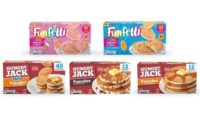A Hometown Celebration
By Dan Malovany
When Franz Family Bakeries opened the doors of its $42 million bakery in Springfield, Ore., the community came out in droves to marvel at the state-of-the-art operation.
In between songs by the Dave Matthews Band, Creedence Clearwater Revival and Jethro Tull, Jeff Clark of KZEL 96.1 FM urged parents to round up their kids on a cloudless 75ºF morning during the dog days of summer and check out the new home of Williams bread.
“It’s an unbelievably fantastic new bakery,” Clark said in a broadcast from the 160,000-sq.-ft. facility back in August. Besides, he added, Franz Family Bakeries was handing out free hot dogs, cookies, chips and soda, as well as mini-loaves of bread for those who took a guided tour of the plant.
“Come on out, and we’ll lay some bread on you,” the deejay urged. There also were chances to win Franz T-shirts, water bottles, yo-yos and backpacks. In addition, one lucky person would win one free loaf of bread per week for the next 20 years in the company’s “Bread for Life” contest.
“That’s a lot of bread,” the deejay told his listeners. Moments later, he would opine, “There’s nothing better than the smell of bread.”
In addition to the live broadcast from the bakery on 2000 Nugget Way, Franz had promoted the grand opening during the previous weekend in two full-page ads in the Eugene Register-Guide suggesting to readers that they “Get a Taste of the New Franz Bakery—Home of Williams Bread.”
Moreover, during the VIP tour the day before the Franz Kids Day celebration, the company invited some 300 people, including its customers, suppliers and the mayor of Springfield, Ore., for a private tour and ribbon-cutting ceremony. The ribbon, appropriately, was made out of Franz bread bags tied together. In addition, the local press received private tours, ensuring that the message about the grand opening would get out to the public.
By the end of the next day, more than 5,000 people would travel through the $42 million operation, which houses a high-speed bread line that cranks out 150 loaves a minute and a bun line that bakes up to 800 pieces a minute.
From 11 a.m. to 4 p.m., the bakery’s employees handed out about 4,500 hot dogs and even ran out of paper “Franz” baker hats as kids and their parents lined up four abreast, a city-block long, in what could be best described as a neighborhood celebration.
“The number of people who came out in support of the bakery was incredible,” notes Ron McKnight, Franz’ vice president of marketing.
He adds that people who toured earlier in the day began calling friends and family, urging them to take a tour of the bakery because it was a lot of fun. Others recalled how they had toured Williams’ Bakery when it first opened decades ago. Franz has since closed the old Williams facility in Eugene, Ore., because the nearby University of Oregon purchased the property to build a new basketball arena in its place.
For Franz Family Bakeries, the opening of the Springfield operation was one of the highlights of a yearlong celebration of the company’s 100 years in business. For Bill Zimmerman, Franz’ corporate operations manager, building the bakery was a task he thought would never happen in his lifetime.
“This is the first time we ever built a bakery from the ground up,” he says. “I’ve been in the industry for 40 years and never thought I’d have the opportunity to do this.”
Learning From Experience
Building the Springfield bakery will allow Franz to better serve its southern territory, where it has experienced geographic growth over the last few years. When all efficiencies are realized, the new bakery will have 20-25% more capacity than the operation it replaced.
Overall, with its 620 routes, the company’s direct-store delivers more than 1,200 baked goods throughout Washington and Oregon and out east to Billings, Mont., and down south to Eureka and other markets throughout northern California. Beyond its DSD system, Franz serves parts of Alaska and national accounts with cookies and frozen baked goods.
Moreover, the Portland, Ore.-based company has six bakeries that produce breads, rolls, buns, bagels, English muffins, cookies, doughnuts and sweet goods under the Franz, Williams, Snyder’s, Gai’s, Seattle International, Bay City, Smith’s and New York Bagel Boys brands. The company also sells products under franchised brands such as Innkeepers, Aunt Hattie’s and Milton’s.
In addition to increasing capacity, the Springfield bakery has several new systems that provide cost savings, increase product consistency, add versatility to the operation or minimize much of the manual work done at the old Eugene facility. For example, the automatic pan storage-and-retrieval system eliminates lifting. The ergonomically friendly system is so advanced that it can be programmed to work 23 steps ahead of the lines’ current functions and handle up to 25,000 pans, which the bakery will have when it’s fully operational.
To provide front-end controls, the pre-programmed batching system can precisely dispense more than 15 minor ingredients such as salt, gluten and granulated sugar at rates of 50-120 lb. a minute into a 2,500-lb. bin that feeds the mixers.
To lower energy costs, Zimmerman notes, the company installed a thermo-oil system instead of a conventional boiler. Unlike water, which has to be reheated after each cycle, oil retains its heat and could save the bakery $80,000 to $100,000 annually in natural gas costs. This system, along with glycol water chillers and other infrastructure, is located on a mezzanine level to save floor space.
Additionally, programmable controls are used throughout the bakery to enhance product quality and to reduce errors and physically demanding tasks in the operation.
“Instead of a physical workout, we now mentally work them out,” Zimmerman explains.
Features such as an air-cooling and purification system were installed to protect product integrity and provide worker comfort. Others such as a patio for lunch breaks that allow for a view of the Cascade Mountains were devised to improve the quality of life at the bakery.
“We’re going to take the lessons learned here and move the best systems eventually to our other bakeries,” Zimmerman explains.
Pit Crew Mentality
The Springfield bakery is designed to be a 24-hour operation that will run 160 hours a week with two four-hour periods for preventive maintenance. Zimmerman uses a racecar analogy to describe how it should work.
“We need to have a pit crew mentality when it comes to maintenance,” he says. “It’s going to be like at the Indy 500. We have to be able to change the tires and fuel it up in 14 seconds.”
When it comes to changeovers, production will have to think in terms of seconds instead of minutes. Because the bakery produces 50 different varieties of bread daily, shaving off 10 seconds on one changeover and 20 seconds on another can add up to big savings on an annual basis.
“Our engineering and maintenance staff needs to change their attitude and adapt to a real-time operation when it comes to keeping the bakery running,” Zimmerman explains. “We need better communication and people taking responsibility for their area. We need to get the car out of the pits quicker. Everybody needs to help in pushing it out.”
Located on 20 acres, the Springfield bakery was built in record fashion. From the time it broke ground in 2005, it took only 12 months before baked goods rolled off the lines.
Like Franz’ other plants, the new bakery is pretty much a self-sufficient operation.
“We have very little exchange of product because of transportation costs and because we’re a sales-driven company,” Zimmerman says. “We just don’t produce white bread. I can’t think of any place in the nation where you’ll see the variety that we produce here.”
Cranking Out Variety
The bakery has seven flour silos holding 360,000 lb. of white flour, 130,000 lb. of wheat flour and 230,000 lb. of mixed grains. Bulk cream yeast, sugar and shortening systems also feed the lines.
To produce its breads and buns, Franz uses a sponge-and-dough system. Sponges are produced in a 2,000-lb. horizontal mixer and receive a 4-4.5-hour ferment at 80ºF and 80% relative humidity in an automated fermentation room with a capacity of 9,000 lb. per hour. The semi-automated fermentation room for the bun line cranks out 5,000 lb. an hour. Two 2,500-lb. horizontal mixers feed the bread line every 10 minutes with a continuous stream of chunks feeding the divider. The bun line has a 1,200-lb. sponge mixer and 1,600-lb. horizontal mixer from where the dough is sent to the divider every 12 minutes.
The versatile bread line has both a six-pocket piston divider for heavier variety breads and an extruder divider for premium white bread production. When the bakery is not using one divider, it’s using the other with a duel-belt delivery system, Zimmerman says. After rounding, dough pieces receive a 90-second rest before moulding and depositing into five-strap pans.
To ensure consistency, a checkweigher monitors the dough pieces and electronically sends signals back to the divider to adjust their weight. Franz uses a bread moulder that can be changed anywhere from a 32-degree angle for tender curl moulding to a 90-degree angle for less tight cross-grain moulding.
“We produce everything from a 3-lb. loaf with a 53-oz. scaling dough piece to a 19-oz. piece on this line,” Zimmerman notes. “Therein lies my challenge. We feel having the most flexibility allows us to produce the products that we need to run.”
Buns are produced on an extruder bun divider at a rate of up to 800 pieces a minute. Here, dough pieces range from 1 oz. to 6 oz.
After proofing on a half-mile long dual spiral conveyor for about 1 hour, bread loaves bake for about 19-20 minutes in a 150-ft. tunnel oven. After passing through a post-oven topping system, the baked loaves travel through a 1-mile long ceiling cooler for about 60 minutes at a rate of up to 9,000 loaves per hour before packaging.
The bun proofer can handle up to 7,500 lbs. of product an hour before baking for 7.5 minutes to 10 minutes and cooling for 20 minutes on a quarter-mile long ceiling conveyor.
Added Food Safety
The bakery uses two metal detectors on both its bread and bun lines. The extra metal detector is crucial for food safety, Zimmerman explains.
“If one of your metal detectors goes down, what are you supposed to do?” he says. “Your customers expect all bread to be metal detected. Basically, it’s for protecting our customers.”
The bread line has three systems that slice, overwrap and bag loaves at a rate of 50 per minute. Another slicer/bagger is available for straight-line packaging. The bun line provides products for both retail and foodservice, and has two slicer-baggers, but also the capability to case-pack buns that can be delivered fresh or frozen to the company’s foodservice customers.
To get products out of the bakery as quickly as possible, the warehouse has nine bays that can load three triple-trailer transports at one time. Moreover, Franz designed the lot so that the trailers have ample room to maneuver around. During the grand opening, the bakery also was ramping up its vehicle maintenance center.
The facility has been designed for expansion, Zimmerman adds. For instance, the wall in the ingredient warehouse can be removed to add production capacity in the future.
Moreover, Franz installed the necessary infrastructure so that it can install an in-line basket conveying system in due time. In the short term, the bakery plans to add a crouton line within the next year.
Overall, however, the emphasis during the design of the Springfield bakery was to build an operation that would serve the 100-year-old company in the long run.
“We did not build this bakery in mind to serve the market for a day, week, month or year,” Zimmerman explains. “We built this plant for serving our customers for 20 years from now.”
Plant at a Glance
Company: Franz Family Bakeries
Location: Springfield, Ore.
Plant Size: 160,000 sq. ft.
Cost to Build: $42 million
No. of Employees: 150, currently
Products: White bread, variety bread, hamburger buns, hot dog buns, soft rolls
Bread Line Capacity: 150 loaves a minute or 15,000 lb. an hour
Bun Line Capacity: 750 buns a minute or 7,500 lb. an hour
Location: Springfield, Ore.
Plant Size: 160,000 sq. ft.
Cost to Build: $42 million
No. of Employees: 150, currently
Products: White bread, variety bread, hamburger buns, hot dog buns, soft rolls
Bread Line Capacity: 150 loaves a minute or 15,000 lb. an hour
Bun Line Capacity: 750 buns a minute or 7,500 lb. an hour
Key Personnel
V.P., Gen. Mgr.: Todd Cornwell
Bakery Mgr.: Keith Sammons
Production Mgr.: Troy Duwe
Chief Engineer: Kim Arnold
Sanitation Mgr.: Clyde Carson
Accounting Mgr.: Debbie Hookland
Shipping Mgr.: Scott Knipe
Bakery Mgr.: Keith Sammons
Production Mgr.: Troy Duwe
Chief Engineer: Kim Arnold
Sanitation Mgr.: Clyde Carson
Accounting Mgr.: Debbie Hookland
Shipping Mgr.: Scott Knipe
For more information on Franz Family Bakeries, visit www.snackandbakery.com and check out our May 2006 issue.



